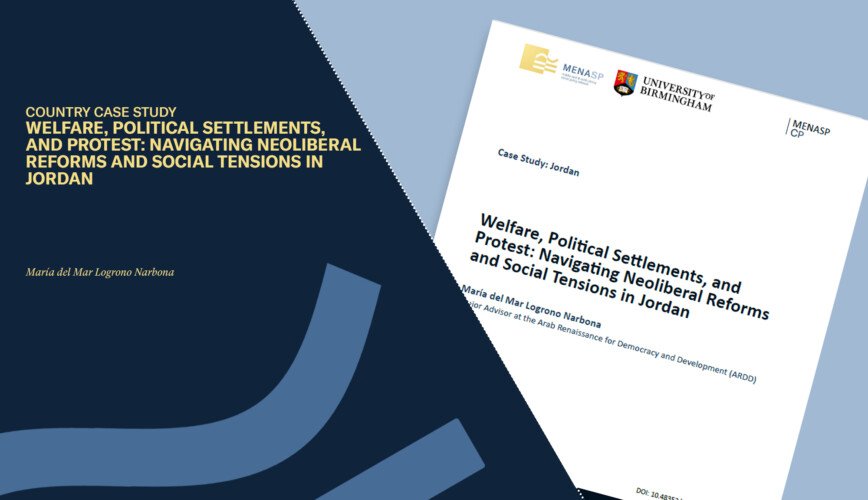This research examines the intersection of social welfare and conflict in Jordan, providing a detailed analysis of the evolution of the country’s social protection mechanisms and the nature of protests over the past decade, while also tracing longer-term patterns.
Jordan’s political stability has historically hinged on a system of economic patronage, referred to as the “Hashemite Compact,” through which state resources, such as public sector jobs and subsidies were allocated to secure the loyalty of key constituencies, particularly East Bank Jordanians. However, the introduction of neoliberal reforms in the 1980s and 1990s began to dismantle this social contract. The state gradually shifted from universal welfare provisions to targeted social programmes, including the National Aid Fund (NAF), leading to rising economic inequalities and weakening traditional loyalties, which in turn triggered increasing public dissatisfaction and sporadic protests.
The findings of this study reveal that the erosion of welfare entitlements has been central to the growing dissatisfaction, particularly among East Bank Jordanians, who have seen their economic advantages diminish. While Jordan has largely avoided violent unrest, this gradual rollback of state support has contributed to significant protests, most notably in 2018, which exposed widespread frustrations over socioeconomic inequality and government policies. In response, the state has employed tactical measures to contain these protests, including temporary economic concessions and reliance on external financial assistance, without addressing the deeper structural issues at play.
Furthermore, the paper addresses the Syrian refugee crisis and its impact on Jordan’s social and economic infrastructure. The influx of refugees has placed additional strain on resources and exacerbated tensions between host communities and refugees. Despite efforts by the state to manage the crisis, these measures have been insufficient to alleviate the rising tensions or address the underlying socio-economic disparities that pervade Jordanian society.
Finally, the study explores how the Jordanian regime has managed protest movements through a combination of coercive tactics, such as the use of security forces, and non-coercive measures, including political liberalization and symbolic reforms. The regime’s strategy of deepening societal divisions between East Bank Jordanians and Palestinians has effectively undermined unified opposition movements, allowing the state to maintain its grip on power despite ongoing economic challenges.
DOI: 10.48352/uobxmenasp.0029
Author: María del Mar Logrono Narbona, Senior Advisor at the Arab Renaissance for Democracy and Development (ARDD)
This project is supported by the Middle East and North Africa Social Policy Network (MENASP) at the University of Birmingham, in the framework of its ‘strengthening social welfare and security in the MENA region’ research programme, funded by the UK Arts and Humanities Research Council’s Global Challenges Research Fund.
Disclaimer: The opinions expressed in this publication are those of the authors. They do not purport to reflect the opinions or views of the Middle East and North Africa Social Policy (MENASP) Network or the University of Birmingham.
